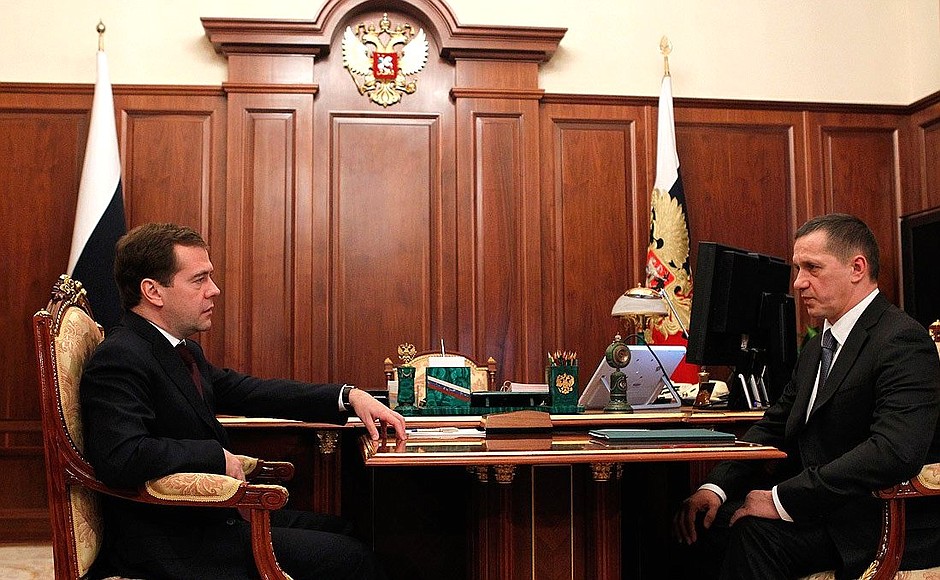
* * *
President of Russia Dmitry Medvedev: Mr Trutnev, we have been discussing the current environmental situation in the country for a long time. We haven’t been just talking, of course, because it is my duty to monitor the situation in this sphere, and you as the Minister are directly responsible for it. But talking won’t get us anywhere and we must act because despite certain positive changes, there are plenty of problems.
This issue was on the agenda of the State Council meeting and I issued instructions to the Government to draft a number of bills aimed at improving the environmental situation in the country, including the introduction of environmental monitoring, environmental regulation and the management of these processes.
What has been achieved so far?
Natural Resources and Environment Minister Yury Trutnev: Mr President, as per your instructions seven bills have been drafted. Their aims are to strengthen environmental monitoring, introduce environmental audits, change the regulation system and introduce new economic incentives for modernisation processes, as well as to protect the marine environment from pollution and improve the quality of control.
All of these draft laws have already passed one round of approvals in the Government. Now we are finalising them taking into account the comments of the Presidential State-Legal Directorate, and together with our colleagues we hope to complete this work in the first six months of 2011, perhaps, by already adopting these laws.
The draft laws significantly change the system of environmental regulation and, most importantly, create conditions for the adoption of the best technologies and promotion of sustainable development of Russian companies. We hope that these measures will not only improve the environment, but also boost the economy of the Russian Federation.
This is not a one-off measure: overall, the law stipulates that the transition is made in stages. Fines for the negative impact on the environment will be increased in two stages, in 2012 and 2014. But the final transition to the best technologies available will take place in 2020. At the same time, the most stringent monitoring standards will be applied only to those companies that cause the maximum negative impact on the environment. There will be about two thousand such companies.
All together, 11,000 out of the one million enterprises in the Russian Federation account for 99% of environmental impact. Other companies that do not have such a major impact will get various incentives, such as a reduction in administrative barriers and transition to declaration principles.
Dmitry Medvedev: First, we must move forward in this direction – in the development of environmental legislation – along with the rest of the world. That is, we must neither lag behind the global trend, not get ahead of ourselves, proposing that we do things we are not capable of achieving at present, and we certainly must not stay in the same place as we are today.
In the Presidential Address to the Federal Assembly I said that clear terms must be introduced for companies that have a major impact on the environment. On the one hand, they must introduce as far as possible modern environmentally friendly technologies. Therefore, the companies that follow these recommendations and introduce new technologies, investing real money in treatment facilities and other new facilities and reducing environmental damage, those companies must get certain incentives, so that they see the light at the end of the tunnel.
If, conversely, a company behaves irresponsibly, if it does not implement its plans even when it has the opportunity to do so, such company certainly must bear the full brunt of state pressure through financial penalties. Such a model must be developed within the framework of the seven draft laws you mentioned. Once this is done, and I give you three months for it, please report to me personally.
Yury Trutnev: Yes, Mr President.
Dmitry Medvedev: Agreed.
<…>
